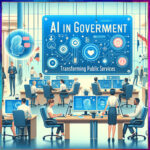The government of Alberta is considering a significant and innovative step by exploring the use of artificial intelligence (AI) to draft legislation for an upcoming “Alberta Whisky Act.” This initiative, led by Minister of Service Alberta and Red Tape Reduction, Dale Nally, aims to establish specific regulations defining what constitutes an “Alberta whisky.” Nally believes that this undertaking serves as an ideal test case for AI technology, emphasizing that the stakes are manageable—“there’s no hearts or lungs involved,” he remarked. “If a mistake is made, we can course correct.”
In a recent meeting with Alberta Technology Minister Nate Glubish and Justice Minister Mickey Amery, Nally garnered support for the AI-driven project. The ministers agreed that once the AI-generated draft is complete, it will undergo review to ensure accuracy and alignment with established policies. Minister Amery’s team will verify the legislation for any possible errors, allowing for adjustments as needed. Nally expressed enthusiasm for the potential of employing AI in legislative processes, stating, “We’re kind of excited that you can actually use AI to write legislation right now.”
This move positions Alberta as a potential pioneer in Canada for utilizing AI in legislative drafting, standing in contrast to other provinces. According to a recent inquiry, jurisdictions such as British Columbia, the Northwest Territories, and several others are currently not employing AI for similar purposes. The British Columbia Ministry of Attorney General noted, “While we continually explore tools that can improve efficiency and clarity, the process remains a human-led legal function to ensure accuracy, consistency across the statute book, constitutional compliance, and alignment with government policy.”
Expert Opinions on AI’s Role in Legislation
Jonathan Schaeffer, a professor emeritus of computer science at the University of Alberta and a former Canada Research Chair in artificial intelligence, described the initiative as “innovative and groundbreaking,” provided that appropriate safeguards are implemented. He cautioned that while AI can assist in drafting, human oversight is essential. “Humans must understand what the legislation is saying, what it’s missing, and what needs to be fixed,” he explained. “They also have to put it in the Alberta context.” Schaeffer pointed out that the AI’s training data may not always align with the unique cultural and legal frameworks of Alberta.
Since October, Nally has been tasked with defining the rules for a product to be officially labeled as Alberta whisky. The government is actively consulting with industry stakeholders to shape the definition. As the CEO of Edmonton-based Hansen Distillery, Keenan Pascal noted, the concept of Alberta whisky is deeply tied to the region’s ingredients and environmental conditions. He believes that the legislation could enhance Alberta’s reputation on an international scale, further solidifying its place in the global whisky market.
Nally emphasized that while AI may contribute to drafting the whisky legislation, it will still undergo extensive review before finalization. “We may go down this path and say, yeah, it was great, but we wouldn’t do it again, right? Or we may say, wow, this is something that needs to be incorporated,” he stated. This initiative is not about replacing human contributors but rather complementing their efforts.
Looking ahead, Nally hopes to introduce the whisky regulations in the legislative agenda this spring. By leveraging AI, Alberta aims to streamline the legislative process while ensuring that the final product accurately reflects the region’s identity and standards. As this project unfolds, it will be interesting to observe the balance between innovative technology and the necessity of human oversight in critical legislative matters.
See also Deloitte’s $1.6M Healthcare Report in N.L. Contains AI-Generated Citation Errors
Deloitte’s $1.6M Healthcare Report in N.L. Contains AI-Generated Citation Errors Government Launches YUVA AI Program: Free AI Training for 1 Crore Students and Citizens
Government Launches YUVA AI Program: Free AI Training for 1 Crore Students and Citizens Governments Must Address Job Concerns Amid AI Investments, Says PM Wong at G20
Governments Must Address Job Concerns Amid AI Investments, Says PM Wong at G20 Researchers Unveil AI Adoption Framework for Higher Education and Government Sectors
Researchers Unveil AI Adoption Framework for Higher Education and Government Sectors Governments Accelerate Ethical AI Adoption for Enhanced Security and Citizen Trust
Governments Accelerate Ethical AI Adoption for Enhanced Security and Citizen Trust





















































